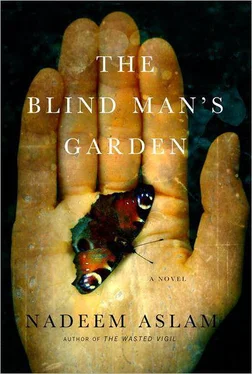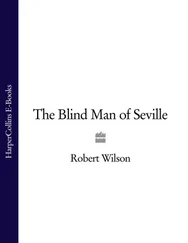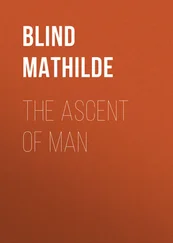The person who betrayed them was a member of the family that was sheltering them — and he has been found butchered by al-Qaeda in retaliation.
He drinks the apple-green tea from a bowl. One man asks him why Akbar’s father had not attended the dawn prayer at the mosque today. ‘It just isn’t the same without him,’ the man smiles. ‘It feels like a wedding procession without a bridegroom.’
‘He has been unwell,’ Mikal says, draining the bowl and standing up, chewing the softened leaves.
‘Yes, the martyrdom of his son and son-in-law has been very hard on him,’ the man says, nodding. ‘The bodies arrived with their hands and feet tied with barbed wire.’
‘Those boys fought the thugs of the West very bravely,’ another man says. ‘They knew that a coward dies but his screams last forever.’ And all the while the adze in the shop next door, that sells coffins and ladders, is repeating, ‘… black as night … black as night … black as night …’
He returns to the house and enters the gun factory to work. He has no desire to handle another gun as long as he lives but he doesn’t know how else to repay the family for their hospitality, telling himself that it is only for a few more days. After an hour he interrupts his work, his hands black with metal dust. He takes off his shirt and wipes under his arms with it. He throws it aside and takes a clean one from a cupboard and puts it on while standing before the window, looking out at the Datsun.
He walks out to the Datsun and bends towards the door and picks off one of the flowers pasted onto the paintwork. Dried now by the sun to a scrap of crisp onion skin. He looks at it for a long time and the Airedales watch him from the shade of the trees, their dyed legs making them look as though they have waded through blood.
He has not seen these yellow flowers anywhere along the route from the house to the mosque.
Around noon when he drives into Megiddo to collect a consignment of scrap metal that a new set of gypsies has brought, he goes slower than usual so he can inspect the vegetation on either side of the narrow road. There is nothing much, just thorn bushes and certainly no yellow flowers.
On the way back he turns onto a small path, the dust blowing from under his tyres and twisting away sideways, and after fifteen minutes he comes to a field at the base of a row of hills, a meadow the size of four cricket grounds, full of tall yellow flowers, the colour so intense it makes the eyes ache.
He conducts a brief search among them but not knowing what he is expecting to find he just stands looking at the hills in the end. Who did he meet here at dawn? The Pakistani soldiers? The Americans? The hills are infested with bandits and from this distance look like pyramidal heaps of coloured earth, piled there by man instead of having an origin in nature, some taller than others, some red, others with more yellow than ochre. Was he hiring an assassin to murder the cleric who sent his boys to their deaths?
The next day the paintwork is dotted with yellow again when the father returns from the dawn prayers and Mikal watches him from the riverbank, the sky above him soaked with a gentle merciful light, and a few hours later the men in the bazaar ask him again about the father’s health. He watches the tide of movements around the house throughout the day, feeling the girl’s presence behind the slabs of walls, and suddenly they are all bodies assigned for wounds, sites of destruction.
He climbs down from the night wall.
Carrying the leopard in his arms he walks into the empty kitchen. Onions and coriander in a basket. Eggs. Clean pots. There is a tassel of corn silk in the basket and he strokes its softness. It is in filament form but essentially it is the same material out of which flower petals are made. On the far side is a whitewashed arch and he is looking at it — the section of the house he has never entered, where the women are. He walks towards it eventually and lifts the curtain draped across the arch to reveal a wide room with sofas against the left and right walls, a table with a mirror framed in ivory, a clock in the shape of a proud-looking mosque. In the wall directly opposite are two doors. One is set in a recessed arch, identical to the one in which he is standing, but the other is narrower and not as tall. He puts the cub on the floor to see where it will go but it remains at his feet and he squats beside it and gently encourages it to explore. Failing, he picks it up and walks towards the smaller door and opens it.
An enclosed passage hung with framed verses of the Koran.
He looks over his shoulder before entering. There is a window directly before him at the other end of the passage, the saptaparni trees visible through the diamonds of stained glass, and there is a door on either side of the window. Both have clear glass panels and when he looks in through the one on the left he sees a desk and a shelf of gold-spined religious books. The stuffed head of a black bear with a pink mouth. A framed family tree that displays only the names of the males. The right door gives onto a stone staircase but instead of climbing it he turns and rushes back, the audacity leaving him.
Five minutes later he is back, and he goes up the stairs and emerges onto a balcony lined with pots that have intensely scented orange trees blooming in them. Two whitewashed steps lead to a door.
He stands on the first step and looks in through the glass square. But only after another turning back, and returning ten minutes later, does he open the door and place the cub on the floor, and it touches the stone tiles with its nose and sets off to the other side of the room, a stride both purposeful and beautiful, and he watches it disappear through a curtained arch.
‘I have to leave here soon,’ he says quietly. ‘I have to go back home.’
Nothing from the other side of the cloth.
He turns to leave but stops on hearing the rustle of the curtain.
*
He returns to the top of the wall just before dawn, the leopard in his arms. ‘Don’t say a thing!’ he tells the animal in a low voice as he lies there. ‘Don’t you dare say a thing!’
Father Mede leans down towards a rose to take in its scent. It is the striped variety named Rosa Mundi. He is seventy-five years old, and as he walks towards the south boundary wall of the school, he stops now and then at various plants. Now he is at the hedge of wild jasmine. For how many generations have the children taken off the small green cap from the back of a wild jasmine flower and sucked the sweetness out of the thin tube? Making sure that he is unobserved, he does it now, and he is astonished that the drop of nectar tastes the same now as it did all those decades ago.
He knows what the word means. From the Greek. Nek tar. That which overcomes death.
He is descended from Joseph Mede, the Cambridge don and teacher of Milton, and although the family is from Wiltshire, Father Mede’s childhood was here in the Punjab during the Raj.
He resumes his walk. At the south wall is a grove composed mainly of dense rosewoods and cypresses, and one of the children had reported a hornets’ nest in an alcove somewhere along there. Father Mede wishes to determine whether it poses a threat to children, in which case the gardener will have to be told to remove it. The lines from Moses’ valedictory song go through his mind as he recalls eating the saccharine substance from hornets’ nests.
He suckled him with honey from a rock,
And oil from a flinty stone.
Soon after entering the grove he hears a sound that resembles the long dry crack that a tough cloth would give on being torn. The ground shudders and he looks around, earthquake being his first thought. He attempts to steady himself against a rosewood but the mighty trunk lightly swivels away from him, and overhead the entire crown swings sideways and the tree begins to fall. He tries to support it out of reflex and the trunk pulls him off his feet and it is like holding a fishing rod with a thousand-pound fish on the hook. He realises that the trunks of all the trees here have been severed, someone’s blade going through them at sternum height. They were just standing in place waiting for the merest touch, the meshed canopies providing the minimum steadiness until now, and they are crashing around him, the falling boughs generating a wind. In Joseph Mede’s Key of Revelation a historical meaning was given to the various symbols of Revelation and ‘winds’ had always meant ‘wars’. Dust fills his eyes, nothing but the torn leaves and branches around him as he attempts to gain a place of safety, the dark red flowers of the Madagascar gulmohar erupting into the air as the green limbs come down and he stands mercifully unscathed and watches how the place has suddenly filled up with light, the sky painfully exposed.
Читать дальше












